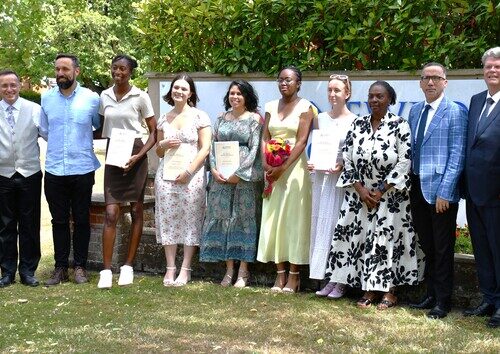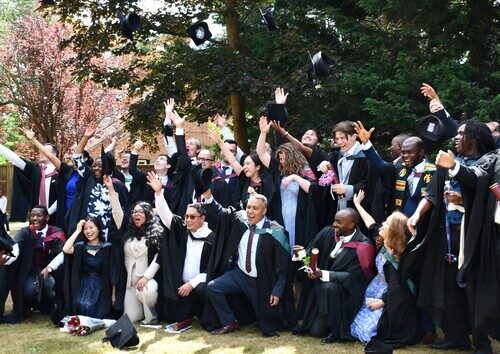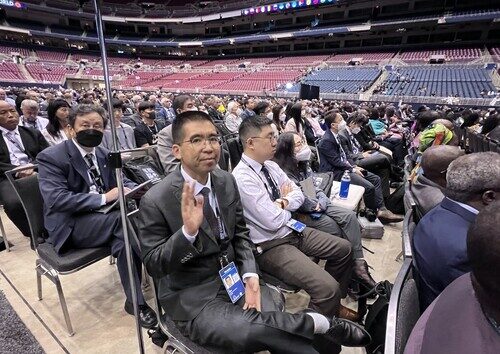22 February 2023 |Rotterdam, Netherlands [Advent Magazine with tedNEWS]
In the fourth quarter 2022 edition of the Netherlands Union Conference magazine ‘Advent‘, profiled is long-standing member Freida Southuwat-Tomasoa, of Moluccan origin, indigenous to the Maluku Islands (also called the Moluccas), Indonesia.
From struggle to dialogue

“Sugar!” That’s what Frieda Souhuwat-Tomasoa thought when she drove back from Assen to her hometown of Capelle aan den IJssel, Netherlands, one Saturday evening in June 1977. Observing a huge number of military vehicles heading north, Frieda was determined to come up with a plan to end the train hijacking at De Punt, which had already lasted three weeks. The Dutch government, however, was tired of waiting and had decided to end it by force. More on her dramatic role as a mediator in a crisis situation later, but first we need to go back a little further in time.
The book “A Forgotten History” by Coen Verbraak, contains fourteen interviews with leading leaders from the Moluccan movement. Frieda is one of the interviewees. At the kitchen table in her home in Capelle aan den IJssel, she talks about her long commitment to the Moluccan cause.¹
After the declaration of Indonesian independence in 1949, the family could not stay in the country. It was quite a transition for the Tomasoa family. From a spacious house (‘we had a privileged position’) to a small room (six metres by three) in the former Vught concentration camp, as a child of four, Frieda hardly realised where she had ended up. “As a child you want to play. Only later, at the premiere of Coen Verbraak’s interview series in Hilversum, did I see the images of Camp Vught again. Then I got emotional. Also, because I thought: that’s how my parents lived there.”
It was in 1951 that Frieda arrived in the Netherlands with her parents and three brothers. Frieda’s father had played a prominent role in the Dutch colonial army (KNIL) and was in the resistance during the Japanese occupation. Het narrowly escaped being beheaded by a Japanese native.
The Adventist Family
Frieda’s grandparents had converted to the Adventist faith in the Moluccas. That also played a particularly important role for her parents and Frieda herself. “It was a very difficult time for the family. I’m sure faith kept my parents going.” Her mother made sure that Frieda didn’t go to the domestic science school as was usual for girls at the time, but to the Holiday Bible School. Frieda continues, “She was always calm, praying and always looking for a way out. Her motto was: we are now in the Netherlands, and you must do your best here. Me and my father would pray that God would guide us through this. Despite what my parents went through, they were never resentful or hostile.”
Independence for Molucca (RMS)
The stay of Moluccans in the Netherlands was meant to be temporary. At least that was the intention. But with an increasing pressure from the Moluccan community on successive Dutch governments to make a stronger effort for the independence of the Moluccas, it was natural for Frieda to support the establishment of the RMS and so became active within the Moluccan movement. She was later become one of the most important Moluccan leaders.
Although Frieda had a combative spirit, she regretted the radicalization of Moluccan youth in the 1970s. Today, she finds herself committed to dialogue, due, as Frieda points out, “‘to my work for the United Nations. I have volunteered for the Organization of Unrepresented Nations.² Over the years you go through a development. The international work has shaped me. My parents taught me not to return evil for evil. You can change militancy by engaging in dialogue and I’ve seen much more achieved with that. In my role I was sent to countries at war and was a member of the peacemaker teams in Taiwan, Afghanistan and Kurdistan. You can come to a solution with dialogue.”
Mediation Team
Frieda played the same role between 1975 and 1977 when a train was hijacked twice by Moluccan youths in the Netherlands. As the youngest member of the mediation team with the Dutch government, she explains, “Prime Minister Den Uyl gave us another chance to convince the young people to lay down their arms. We thought the mothers would be able to convince the youngsters to stop the hijacking. It did not come to that, because Minister Van Agt ordered military intervention. The military had orders to shoot the hijackers.”

The violent end of the train hijacking caused anger and sadness in the Moluccan community. Frieda praises Mr Manusuma, who was then RMS president. “Together with Rev Metiari, Manusama managed to calm down the community.” Frieda further explained, “He also made it clear that the Moluccan community must live according to the laws and standards of this country. That was always his message. Hats off to that. He was a strong leader.” Frieda also thinks that eventually the Moluccan youth realized that actions had no effect and that dialogue works better.
Conversation with Netherlands Prime Minister Rutte
Fast forward to 2022 and Frieda shares that talks are now underway with the Dutch government about strengthening their relationship with the Moluccan community. In particular, in a recent developement, Frieda has been invited to enter into a dialogue with Prime Minister Mark Rutte. “That has never happened in the 72 years that we as a Moluccan community have been here in the Netherlands”, shared an astonished Frieda. “I told him that it is time for a gesture towards the Moluccan community, which is still being worked on, I understand. At long last there has been a turnaround, and the penny seems to have dropped.”
‘Masohi: Sharing and Doing Together.’
Frieda lives with her husband in the Moluccan neighbourhood in Capelle aan den IJssel and would not want to live anywhere else. “It’s our culture – where we share things together. The community is here for us where everyone helps each other. This is how Moluccans are put together. We call that masohi: sharing and doing together.” And Frieda is quick to point out that it is completely in line with her Adventist faith. “Precisely by your actions, by the way you help people in the form as written in the Bible – serving involves not putting yourself first. In that way you are able to command respect.” As an elder at the Adventist congregation of the Rotterdam North church, the principle of ‘Mashoi’ is essential. Frieda also serves on the executive bodies of both the Trans-European Division and the General Conference. “If you see that thanks to the Church, there are projects in more than 200 countries to help people, then I am just very proud to be a member of this church”, she commented.

Relationship with Indonesian Embassy
Frieda is also involved in a new and innovative relationship with the Indonesian embassy. Invited by the new ambassador to get acquainted, “He told me to get rid of the enmity and that we should help each other. Together with us, the ambassador wants to mean something to the people of the Moluccas – which is a poor nation. Because of that poverty, the desire for independence by the Moluccans is becoming ever stronger.”
The natural question to ask Frieda has to be; what will the situation be like between the Netherlands and the Moluccas in ten years’ time? Frieda is hopeful, “I expect progress on the Moluccas, but also for the Moluccans in the Netherlands. If we accept the ambassador’s hand, then we can also see bright spots in the Moluccas. Atjeh in the north of Sumatra now has a form of autonomy, and Frieda hopes that this is also reserved for the Moluccas. “Each island ultimately wants its own people to rule. Perhaps the old idea of a federated state will come back on the table.”
In any case, Frieda supports many social projects on the Moluccas and encourages Dutch companies to invest on the island. “I see it as God’s command, and I also believe in the power of prayer”, she assured. “God will help you because I have experienced that many times in my life.”
- For a brief summary of about the history of the Moluccas from 1945-2000 Encyclopedia Britanica shares the following: “After World War II, in 1945, Indonesia declared its independence, and the Moluccas joined the new republic. The Dutch, however, recognised neither Indonesia’s sovereignty nor its inclusion of the eastern islands. Rather, in an attempt to reestablish authority in the region, the Dutch incorporated the Moluccas into the temporary autonomous state of East Indonesia. In 1949 the Dutch officially granted independence to Indonesia, including the Moluccas. In the following year Christian Ambonese led a revolt against the new republic and subsequently formed the short-lived Republic of South Moluccas. Near the end of the 20th century, tensions between Christians and the large Muslim population of the region escalated into violence that not only killed several thousand people but displaced tens of thousands more. Owing largely to the frequency of such conflicts, the islands were divided administratively into the provinces of North Maluku and Maluku in 1999.”
- The Unrepresented Nations and Peoples Organisation (UNPO) is an international movement and organisation established to empower the voices of unrepresented and marginalized peoples worldwide and to protect their rights to self-determination
The original version of this article can be found in the fourth quarter 2022 edition of the Netherlands Union Conference magazine ‘Advent‘ [Photos: Adventist Media Exchange CC BY 4.0,Tor Tjeransen, Victor Hulbert, David Neal and Advent Magazine]



